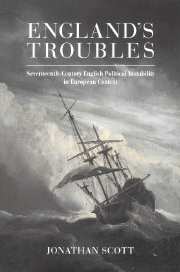Book contents
- Frontmatter
- Contents
- Preface
- Introduction: experience other than our own
- 1 The shape of the seventeenth century
- Part I England's troubles 1618–89: Political instability
- Part II The English Revolution 1640–89: Radical Imagination
- Part III Restoration 1660–1702: Reconstruction and Statebuilding
- 17 Restoration process
- 18 First restoration 1660–78
- 19 ‘Second Restauration’ 1679–85
- 20 Third restoration 1688–94
- 21 Anglo-Dutch statebuilding
- Sources cited
- Index
20 - Third restoration 1688–94
Published online by Cambridge University Press: 04 December 2009
- Frontmatter
- Contents
- Preface
- Introduction: experience other than our own
- 1 The shape of the seventeenth century
- Part I England's troubles 1618–89: Political instability
- Part II The English Revolution 1640–89: Radical Imagination
- Part III Restoration 1660–1702: Reconstruction and Statebuilding
- 17 Restoration process
- 18 First restoration 1660–78
- 19 ‘Second Restauration’ 1679–85
- 20 Third restoration 1688–94
- 21 Anglo-Dutch statebuilding
- Sources cited
- Index
Summary
Because King Charles II was called home by the Convention, and nothing settled, you found the consequence. Charles II was a young man, in the strength of his youth, and, you know, how much Money was given him, and what became of it?
Sir William Williams (January 1689)In the great joy of the King's Return, the Parliament overshot themselves so much, and to redress a few Grievances they got so much Money, that they could live without you.
Mr Sacheverell (January 1689)INTRODUCTION
In chapter 9 we examined the third visitation of the troubles. It was the European context that furnished, in the Dutch invasion, the most important means for the successful confrontation of popery and arbitrary government. By driving out the king, creating an interregnum and presiding militarily over the subsequent constitutional settlement, the invading army exercised considerable control over the final outcome. It was the English historical context, however, that furnished not only the local persons and beliefs but also the experience and constitutional instruments necessary to deliver this outcome quickly and peacefully. For these purposes the most important were the government of the city of London; the unprecedented contrivance of the Assembly of Commoners which met at St James' from 24 December; and the Convention, of both Lords and Commoners, which met from 22 January 1689.
It is the purpose of this chapter to understand the third and decisive phase of restoration in the same contexts. The principal European instrument of restoration was, once again, the Dutch invasion. Initially this deepened the troubles, in the sense that it completed the collapse of governmental authority.
- Type
- Chapter
- Information
- England's TroublesSeventeenth-Century English Political Instability in European Context, pp. 454 - 473Publisher: Cambridge University PressPrint publication year: 2000



